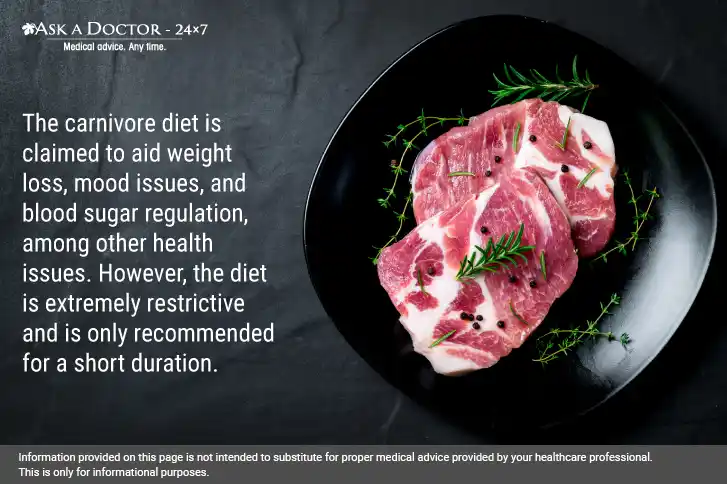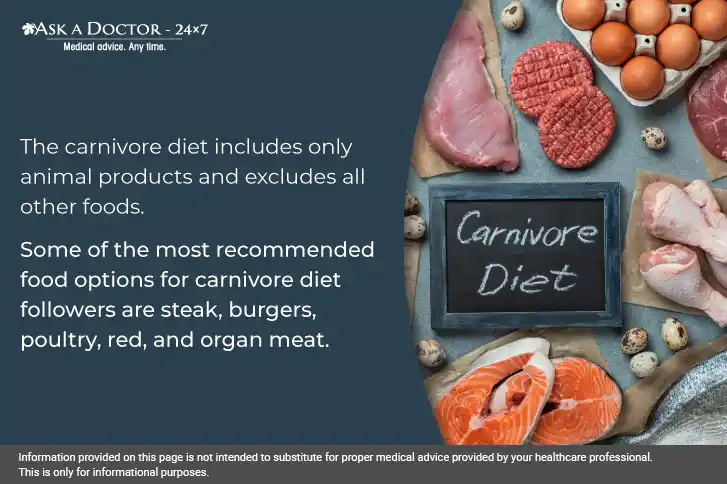Know All About Carnivore Diet
Have you heard about the carnivore diet, well you can probably guess what it’s all about. As the name suggests, the carnivore diet focuses on meat and animal products. The diet has been endorsed by many athletes and celebrities for its positive effects on weight.
Let’s read more about the carnivore diet, its benefits, associated risks, who can go for this diet, and more…
What is the Carnivore Diet?
A high-protein diet has become increasingly popular as a means of losing weight while maintaining or increasing muscle mass. One such diet is carnivore, a form of restrictive keto diet that focuses on eating meat and animal products for every meal. The diet excludes all other food groups including all produce, grains, legumes, nuts, and seeds. It’s high in fat and protein with zero carbs.
Carnivore diet gathered steam in 2019 after release of the Shawn Baker’s book, The Carnivore Diet.
Benefits Of The Carnivore Diet

The benefits of the carnivore diet range from improved digestion, stabilized energy levels, and mood elevation. However, there is no scientific evidence regarding this.
Some of the potential benefits include:
- Catalyst for weight loss: A high protein diet makes you feel fuller after meals, leading to reduced calorie intake. Excluding carbs and amping up on protein increases metabolism and decreases fat mass in the body. Moreover, curbing caloric-dense foods viz cookies, chips, candy, baked goods, and biscuits could potentially promote weight loss.
- High in protein: The carnivore diet is loaded with proteins that help build muscles, heal wounds, and provide the backbone for the body’s many enzymes and hormones. So carnivore diet serves as insurance against health conditions such as poor muscle tone, a weakened immune system, and a higher risk of bone fractures
- Lower your blood sugar levels: Eliminating carbs helps in stabilizing blood sugar levels and energy fallout daily.
- Calmer gut: By eliminating plant-based foods and sugar, you may experience fewer gastrointestinal issues like fiber may cause gas and bloating, and phytochemicals such as flavonoids and tannins may irritate the stomach.
- Reduces inflammation: Removing processed foods and eliminating sugar decreases inflammation.
- Promotes clear and sharp mind: People claim that going on a carnivore diet has improved their mental health and sharpened their skills. Probably due to no blood sugar crashes.
- Reduces risk of artery blockage: Animal products are high in vitamin K2 which decreases calcification of arteries and decreases the risk of development of heart diseases
Health Risks Associated With Carnivore Diet
Diet comes with significant red flags, let’s dive into it:
- Aggravate heart problems: There is an increased risk of developing heart diseases as the carnivore diet prioritizes foods high in saturated fats and sodium and eliminates plant-based food groups.
- Cause dehydration: The carnivore diet may cause dehydration. Carbs act like a sponge and soak up lots of water in the body, so by removing carbs, the body loses water which may lead to anxiety, restlessness, cramping, and decreased performance.
- Makes deficient of vitamins and minerals: In a carnivore diet, you could end up with a major nutrient deficiency as the diet is restrictive. It is difficult to get vitamin C and other plant-based polyphenols from a carnivore diet and thus puts you at risk of scurvy, and could increase inflammation.
- Leads to digestive issues: Fiber is important for gut health and is found only in vegetables. Fiber is considered a seed and fuel for gut bacteria. Messing up with your gut bacteria causes adverse health effects. You may feel nauseated and have difficulty in regular bowel movements.
- Socially restrictive: Sharing food and meals with friends and family brings people together. But with a minuscule amount of food options, it becomes challenging to socialize with others.
- Difficult to follow and non-sustainable. It is difficult to follow a restrictive diet for a long duration. You have limited options and may find it repetitive and boring. so many individuals end up reverting to their old eating habits
- Harmful to the Liver and Kidneys. Excess consumption of proteins may tax and cause damage to these organs. There is a limit on how much protein a body can process.
What You Can Eat in Carnivore Diet?

The carnivore diet emphasizes eating fatty cuts of meat for daily energy needs. The diet emphasizes drinking water and bone broth and discourages drinking tea and coffee.
Animal products are the focus of a carnivore diet and exclude all other foods. Foods allowed on this diet include:
- Meat: Beef, chicken, turkey, pork, lamb, and organ meats etc.
- Fish: Salmon, sardines, white fish, crab, lobster, herring, etc.
- Other animal products: Eggs, lard, bone marrow and broth
- Small amounts of dairy low in lactose such as heavy cream, hard cheese, and butter
There are no parameters or guidance regarding when and how much to eat, or the number of servings per day. Simply, you can eat as often as you desire or when you feel hungry and eat until you feel full.
Conclusion
Having said all the above, the carnivore diet could lead to serious gaps in your nutrition and can be risky for people with heart or gut problems, chronic kidney disease, and high blood pressure if practiced in the long term. This is because it disallows the majority of food groups, thus depriving the diet followers of numerous nutrients. The diet is considered an elimination diet. No research has backed its purported benefits.
You may switch to a carnivore diet for a short span and slowly incorporate new foods back into your diet so that you know which foods are problematic. Before planning any major changes in your dietary pattern, make sure to consult a specialist.
You can Ask a Nutritionist to learn more about the carnivore diet, or you can even book your consultation at Ask a Doctor 24x7 online.
Recently Answered Queries Related to Carnivore Diet and Other Fad Dieting
- Low HB, Thin Body, On Structure Diet. Suggest a Healthy Diet.
- Suggest a Diet Program
- Suggest a Weight Gain Program And Diet
- Does Weight Loss Pills Have Any Long-Term Effects?
- How Much Ghee Should Be A Part Of One's Daily Diet?
- Can I Take HCG For Diet And Phendimetraz Diet Pill Together?
- Atkins Diet, High Protein Diet, Stopped Periods, Not Pregnant, Result Of Diet?
- Is A Keto Diet Safe To Continue While Trying To Manage My Weight?
Disclaimer: Information provided on this page is not intended to substitute for proper medical advice provided by your healthcare professional. This is only for informational purposes.
Ask a Specialist
Recent Questions


